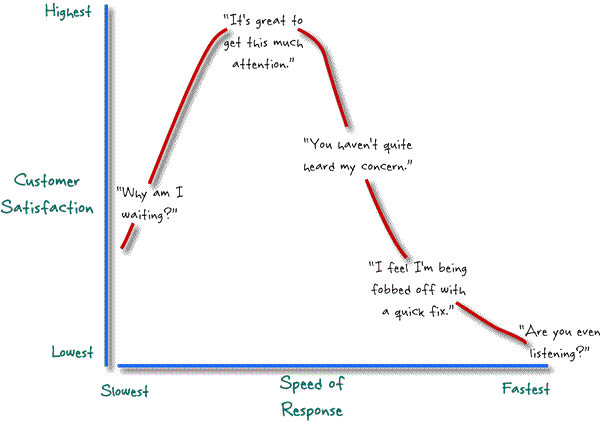Slow Down For Your Customers' Sakes Too

These posts have concentrated on the negative effects that excessive haste and pressure have on the people who work within an organization. What about the customers, clients, pupils, or whoever else that organization exists to serve? Do they also suffer when an obsessive concern for quick results and numerical/financial measures becomes the driving force of policy and action? I believe they do, as the chart above shows.
Naturally, no one wants to be kept waiting with no good reason. A sluggish response to customers or clients won’t build positive business relationships. But going too fast is just as bad—or maybe even worse. Few responses irritate the people you deal with more than the feeling that you aren’t listening carefully to their concerns or needs—especially if they also suspect that they’re either being thrown some standard response and then ignored, or being given a quick fix to keep them quiet.
It’s a fallacy that responding quickly naturally increases customer satisfaction. What people want from you is your full attention to their needs and concerns. Everyone feels better when they know that they are getting someone else’s undivided attention. Doing that takes time. You cannot give the other person your attention for twenty, thirty, or sixty seconds and assume that will be enough. Slowing down is essential to provide excellent customer service. Clients usually measure the quality of the service they have received by the amount of time that the manager or customer service agent spent listening to their concerns, asking relevant questions, and explaining the organization’s response.
Even the value of that response is likely to be judged, in part, by the time and care taken to prepare it. A quick response, even if it is accurate, often feels off-the-cuff and not properly considered. One that has taken longer to prepare starts with the advantage that the customer probably feels you have taken time and care to craft it properly. It still needs to work, but it starts with an initial bonus.
I used to have a very senior colleague who had a fetish for promising every client an instant response, based on his rooted belief that speed showed eagerness and zeal to help them. Not only did his promises cause chaos in the office, as people rushed around in a panic trying to make good on his impossible promises, the quality of the work that could be made ready in such a short time was often inferior.
It wasn’t even as if the client had requested such speed in responding. Mostly, as I discovered on several occasions as I tried to explain that we couldn’t meet the deadlines set, they were surprised and even a little suspicious at what had been offered them. “We don’t need anything that quickly,” some would say to me, “but that’s what your colleague offered.” Others said, “To be honest, your speed was impressive, but when we got what had been prepared, we were a little disappointed.” Of course, some potential clients felt that the fast response that wasn’t quite right suggested our company didn’t meet the standards they required. Those were the ones who simply went to one of our competitors. We lost a considerable amount of business this way, but no one could ever convince the guilty party his approach was doing it.
Slowing down enough to listen and give customers your full attention is virtually guaranteed to produce a significant improvement in the way they feel about you and your operation. And if the way your organization operates denies you this opportunity, that tells you something about the value the business places on its customer base. Maybe you would be better off looking for a place where the links between excessive haste, quick fixes, short-term attitudes, and poor customer satisfaction are better understood.







3 Comments:
Great post. Very useful way of thinking about this issue. Thanks.
Interesting point of view - 'It’s a fallacy that responding quickly naturally increases customer satisfaction.' Has given me something to think about.
Amen!
A great example of this is an experience I recently had at an Apple genius bar. I went to my local store to get them to look at an iPod issue, but found that I couldn't talk to anyone because they were all responding to pre-scheduled appointments with other customers.
You see, you need to make an appointment on the web to schedule time to see someone. You get a full 20-30 minutes of undivided attention. No waiting in line, no 800 numbers, just a real person to work with in real time. Also, with an iPod, if there is an issue they don't send it in for repairs. They only replace it on the spot.
Sounds like a real inconvenience for people who are always in a hurry. However, it was perfect for me because I could schedule an appointment at my leisure and get the customer service I actually need instead of crappy service on demand.
Post a Comment
<< Home